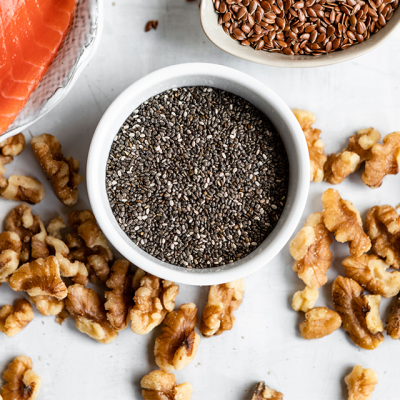First, let me explain a little bit about tryptophan. Tryptophan is an amino acid, building block for protein. I have always thought about it as mediation in food or a supplement. It has many functions in the body and is probably most famously known for converting into serotonin to keep your brain (and gut) happy and healthy.1
What’s fascinating to me about tryptophan is that it actually requires a bit of an insulin response in order to make its way to the brain.2 This is something to think about, especially on a long-term ketogenic diet, and is another reason to add to the list of benefits of achieving metabolic flexibility so that the body can easily cycle out of ketosis as needed or desired.3
Tryptophan also helps with regulating how the liver builds proteins, which may be why it has been studied in terms of longevity.
All of the studies I’ve seen looking at tryptophan restriction have been in animal studies and there seems to be some evidence that even moderate restriction of tryptophan helps to regulate energy balance4, balance hormones, change the microbiome and support weight loss in rats. Reducing tryptophan can even prolong the lifespan in certain animals.5
Now, it is pretty easy to manipulate the amino acid intake in lab animals because they can be fed an exact mixture of amino acid powders. Translating this to humans who eat real food is a little tricky and the jury is still out as to whether restricting tryptophan will have the same effect.
On a ketogenic diet, you mainly get your tryptophan from animal foods so if this pans out as beneficial and you wanted to implement some strategies, you could experiment with reducing your overall protein or even limiting the protein from animal sources to see how you do.6 In Glow15, I discuss protein cycling as a gentle way to boost autophagy. This approach may even have additional benefits that science has yet to uncover!
Supplement Recommendations
Sources and References
- “Tryptophan.”National Center for Biotechnology Information. PubChem Compound Database, U.S. National Library of Medicine,https://pubchem.ncbi.nlm.nih.gov/compound/L-tryptophan
- Ferstrom, J. D., and R. J. Wurtman.Elevation of Plasma Tryptophan by Insulin in Rat
- Vianna, Daiana, et al. “Long-Term Leucine Supplementation Reduces Fat Mass Gain without Changing Body Protein Status of Aging Rats.” Nutrition (Burbank, Los Angeles County, Calif.), U.S. National Library of Medicine, Feb. 2012,https://www.ncbi.nlm.nih.gov/pubmed/21872432
- Gallinetti, Jordan, et al. “Amino Acid Sensing in Dietary-Restriction-Mediated Longevity: Roles of Signal-Transducing Kinases GCN2 and TOR.” The Biochemical Journal, U.S. National Library of Medicine, 1 Jan. 2013,https://www.ncbi.nlm.nih.gov/pmc/articles/PMC3695616/
- Jenkins, Trisha A, et al. “Influence of Tryptophan and Serotonin on Mood and Cognition with a Possible Role of the Gut-Brain Axis.” Nutrients, MDPI, 20 Jan. 2016,https://www.ncbi.nlm.nih.gov/pmc/articles/PMC4728667/
- Kuiken, K A, et al.The Tryptophan Content of Meat. 29 Aug. 1947. http://www.jbc.org/content/171/2/561.full.pdf





